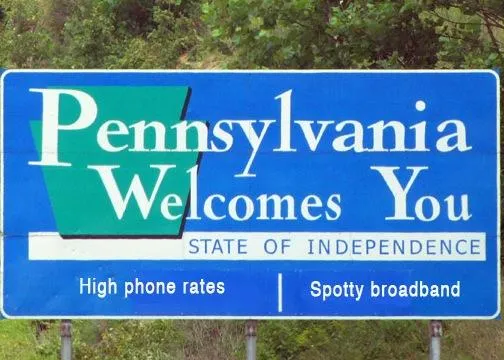Pennsylvania dereg bill will hurt rural broadband

PA Deregulation Bill Will Hurt Rural Broadband Access, Hike Phone Rates
Read the Full Report:A Bad Deal for Pennsylvania: Raising Phone Rates and Putting Telephone Service at Risk. What HB 1608 Will Do to Pennsylvania Consumers.
HARRISBURG, PA (November 13, 2013) – In the lead up to a Pennsylvania House Consumer Affairs public hearing next week, the Keystone Research Center today released a new report documenting that a telecommunications deregulation bill will hurt rural access to broadband service and sharply increase telephone rates.
“This proposal jeopardizes Pennsylvania’s national leadership in delivering broadband service to rural areas and will sharply raise phone rates,” said telecommunications expert and report author Nathan Newman, Ph.D. “Pennsylvania needs next-generation broadband in all communities, not deregulation that locks in substandard rural service.”
HB 1608 is part of a wave of deregulation bills introduced around the country in recent years. Like similar bills in other states, it is structured to increase the profits of telecommunications companies while raising phone rates and putting quality telephone service at risk in Pennsylvania.
The bill allows telephone companies in Pennsylvania to raise rates with only one day’s advance notice by largely eliminating the Public Utility Commission’s oversight of basic telephone service in Pennsylvania. After years of price stability for Pennsylvania telephone consumers, this bill will likely lead to significant price increase across the state.
HB 1608 particularly threatens access to broadband in rural areas. Pennsylvania currently has a higher rate of broadband access in rural areas (93.2 percent) than the nation as a whole (76.3 percent). Of the 23 states with more than a million rural residents, Pennsylvania has the highest share of residents with first generation broadband access. Among the 50 states, only Massachusetts, New Jersey, and Rhode Island provide access to a higher percentage of rural residents.
“This bill will leave rural Pennsylvania and smaller cities on the wrong side of the digital divide,” said Stephen Herzenberg, Ph.D., economist and executive director of the Keystone Research Center.
Phone deregulation in other states has led to significant increases in rates. In neighboring Ohio, rates have increased $1.25 per month (the maximum rate allowed) since passage of the state’s 2010 deregulation law. In Illinois, another state similar to Pennsylvania, AT&T increased line charge rates by up to 63 percent following passage of a deregulation law. In California, some rates increased by several hundred percent.
In addition to increasing rates for telephone service and threatening rural access to broadband, the bill also:
- Abandons rural communities by permitting telephone carriers to eliminate service to consumer they do not want to serve, beginning in 2018.
- Eliminates critical consumer protections, reporting requirements that allow consumers to compare phone rates, auditing requirements that ensure phone company accountability, and quality of service requirements.
- Removes public oversight of telecommunications companies’ mergers and acquisitions.
“Millions of Pennsylvania consumers rely on local landline phone service,” said Dr. Newman. “And like many forms of rushed deregulation, HB 1608 is a bad deal for Pennsylvanians. It will raise phone rates for consumers, undermine effective consumer protections, and take away the ability of state regulators to ensure Pennsylvanians have competitive options over the long term.”
Read the Full Report:A Bad Deal for Pennsylvania: Raising Phone Rates and Putting Telephone Service at Risk. What HB 1608 Will Do to Pennsylvania Consumers.
PA Deregulation Bill Will Hurt Rural Broadband Access, Hike Phone Rates (Keystone Research Center, Nov. 13, 2013)
Report: Phone Deregulation Bill Would Hurt Rural Broadband Access (WESA-FM, Nov. 13, 2013)
CWA members oppose AT&T’s attempts to stop serving rural and low-income communities in California
CWA urges FCC to deny industry attempts to loosen pole attachment standards
CWA District 6 reaches agreement with AT&T Mobility



